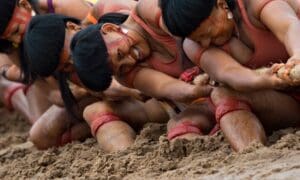 As seen on The Guardian.
As seen on The Guardian.
How is deforestation and climate change affecting the lives of indigenous women?
Women play a very important role in food production and often have to bear the brunt of the added burden of adapting to climate change in forests and farmland. Natural resource developments such as oil palm plantations or oil and gas exploration damage their fragile ecosystems and affect their ability to produce food. Despite this, they seldom have the rights to their lands. Without these rights they stand to lose their sole source of food, income and shelter.
Additionally they are often not allowed to participate in national and international strategies to tackle the issues that affect them. These are challenges that exist right across Latin America.
How is the Rights and Resources Initiative (RRI) helping to address the issues of insecure and unclear land rights for indigenous people in Latin America?
As a coalition we encourage collaboration between our partners and community organisations, who work through research and advocacy to catalyse major breakthroughs in forest and land rights priorities.
We campaign to ensure policy and market reforms allow indigenous peoples and local communities to benefit from the lands they have lived on for generations.
Currently, one of our focuses is on mainstreaming the issue of genderjustice and the promotion of collective rights of women to land and forest.
Is the lack of strong and effective legislation the underlying issue?
Not necessarily. The underlying issue is that women’s rights are often not respected at many levels. Their contributions are not acknowledged within their own communities, in the legal frameworks of their countries, nor are women included in global discussions around natural resource management.
How could enhancing women’s presence in forest governanceimprove resource conservation and regeneration?
Enhancing women’s participation in decisions over land and resources will ensure their knowledge, initiatives and needs are accounted for.
Their lives are intertwined with the forests and they are integral members of indigenous and local communities, and have contributed to the governance of their territories and resources. Their knowledge is important in decisions related to climate change mitigation and adaptation.
How are you working to address this?
We work with our partners and collaborators, like the National Organization of Andean and Amazonian Indigenous Women of Peru, to intervene through research, convenings and international networking opportunities, technical assistance, and communications support.
Two years ago, the Conference of Parties (COP), decided to improve the participation of women in the negotiations on national climate change strategies. However, the United Nations (UN) has yet to address land rights as part of the structural foundations of women’s inequality. Without this no gender equality or climate change solutions can be complete or effective.
To address this gap, we recently brought indigenous women from acrossthe world to Lima for the International Indigenous Women’s Forum, Land and Climate Change: Challenges and Opportunities in COP 20. Our goalis to generate recommendations for the Peruvian government to bring to the forefront of discussions at the COP in December, around women’s role and contributions.
What recommendations have come of the forum?
The forum has come up with 12 recommendations centered on land rights and the contributions of indigenous women and communities to climate change policy at the national and international level.
They include considering women in the tenure and collective titling of lands and territories, requiring states to prioritise empowering communities to adapt to climate change, and creating participatory mechanisms to develop, enhance and strengthen the capacity of indigenous women and our organisations.
There is also a proposed review of legal frameworks to ensure the active, effective and equal participation of indigenous women at all stages and levels of decision-making.
Ultimately what do you hope to see in UNFCCC’s 2015 climate change agreement?
We would like to see the promotion of collective land tenure rights, and the critical role of women within these collective land tenure systems, as major principles for countries to adhere to as a part of any international climate change mitigation and adaptation strategy.
What challenges does RRI face?
As a coalition, RRI has had to overcome challenges experienced by all coalitions in aligning the priorities of our diverse organisations. Our job then has been to connect organisations that perhaps would not have otherwise been working together, and help them see the 80% of their agendas that they agree on, rather than the 20% of their agendas where they diverge.
What best practice can you share?
Listen to the people who live and depend on the lands and forests. Consider women as equal actors and respect their knowledge and contributions. Giving women an equal voice is the best approach to addressing climate change issues in indigenous communities.
Original article – Land rights in Latin America: where are the voices of indigenous women?
